语法复习七:倒装句
语法专题复习倒装句部分倒装完全倒装和语序颠倒

语法专题复习倒装句(部分倒装、完全倒装和语序颠倒)一.知识梳理:1.完全倒装:1)There be 结构2)某些表时间、方位、地点的副词或介词短语放在句首3)作表语的形容词、过去分词、现在分词放在句首2.部分倒装:1)Only+状语2)表否定的副词、介词短语或连词放在句首3)……也如此类(So/Neither/Nor)位于句首4)Such/So……that 如此……以致……5)虚拟类(Were/Should/Had)放在句首6)祝愿类May sb do3.语序颠倒:1)表语/状语/动词原形+as/though+主语+谓语2)感叹句(How/What)3)(whatever/no matter what等)让步状语从句+主语+谓语4)The +比较级+主语+谓语,the +比较级+主语+谓语二.观察并记忆:1.There stands an old temple on the top of the mountain.山顶上耸立着一座古庙。
2.Here comes a bus.车子来了。
3.The bell rang . In came our headmaster.铃响了。
我们校长进来了。
4.On the wall hang two photos.墙上挂着两张照片。
5.Present at the meeting were the teachers and the headmaster.出席会议的有老师和校长。
6.Gone are the days when they had to work hard day and night.日夜辛苦劳作的日子一去不复返。
7.Only when he knew the truth did he realize he was cheated.只有当他知道真相时他才意识到被骗。
8.If you don’t go there tomorrow , neither will I.如果你明天不去,我也不去。
英语语法 什么是倒装句

英语语法什么是倒装句倒装句是一种特殊的语法结构,在英语语法中有着重要的地位。
正常语序中,主语通常出现在动词之前,而倒装句则将动词或助动词置于主语之前,或者将整个谓语或短语置于主语之前。
这种颠倒的语序在英语中具有特殊的语法和修辞效果,常用于强调、疑问、条件句等语境中。
以下是倒装句的几种常见形式和用法:1. 完全倒装:将助动词或系动词放在主语之前。
例如:- Never have I seen such a beautiful sunset.- Only in dreams can we truly fly.2. 部分倒装:将助动词、情态动词或动词的某些部分放在主语之前。
例如:- Hardly had he arrived when the phone rang.- Not only did she finish the report, but she also submitted it early.3. 带有否定词的倒装:将否定词放在句首,然后倒装动词和主语的顺序。
例如:- Never have I felt so alone.- Not until the rain stopped did they go outside.4. 疑问倒装:将助动词或情态动词提到句首,以形成疑问句。
例如:- Is he coming to the party?- Can you speak French?5. 条件句中的倒装:当条件句以介词短语或副词短语开头时,常常使用倒装结构。
例如:- In case of fire, break the glass.- Should you need any assistance, please let us know.倒装句的使用可以使句子更具有强调和修辞效果,增加句子的变化和多样性。
但需要注意的是,倒装句的使用需要根据具体的语境和句子结构来判断,不是所有情况下都适用。
因此,在使用倒装句时,需要注意语法规则和语义逻辑的准确性。
高考英语语法倒装句专题复习
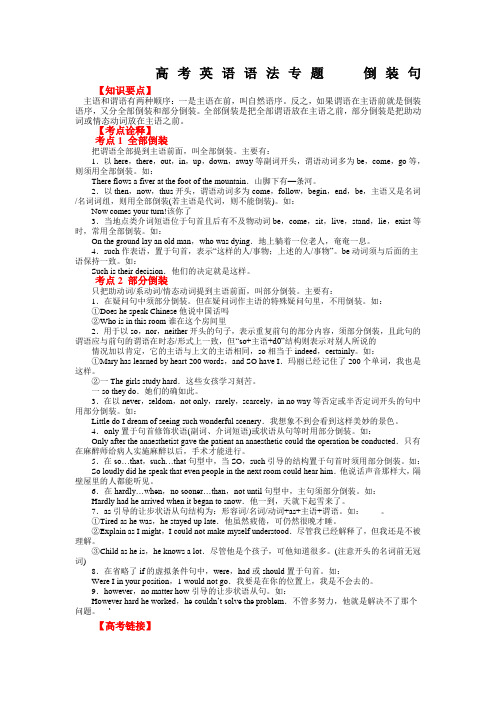
高考英语语法专题倒装句【知识要点】主语和谓语有两种顺序:一是主语在前,叫自然语序。
反之,如果谓语在主语前就是倒装语序,又分全部倒装和部分倒装。
全部倒装是把全部谓语放在主语之前,部分倒装是把助动词或情态动词放在主语之前。
【考点诠释】考点1 全部倒装把谓语全部提到主语前面,叫全部倒装。
主要有:1.以here,there,out,in,up,down,away等副词开头,谓语动词多为be,come,go等,则须用全部倒装。
如:There flows a fiver at the foot of the mountain.山脚下有—条河。
2.以then,now,thus开头,谓语动词多为come,follow,begin,end,be,主语又是名词/名词词组,则用全部倒装(若主语是代词,则不能倒装)。
如:Now comes your turn!该你了3.当地点类介词短语位于句首且后有不及物动词be,come,sit,live,stand,lie,exist等时,常用全部倒装。
如:On the ground lay an old man,who was dying.地上躺着一位老人,奄奄一息。
4.such作表语,置于句首,表示“这样的人/事物;上述的人/事物”。
be动词须与后面的主语保持一致。
如:Such is their decision.他们的决定就是这样。
考点2 部分倒装只把助动词/系动词/情态动词提到主语前面,叫部分倒装。
主要有:1.在疑问句中须部分倒装。
但在疑问词作主语的特殊疑问句里,不用倒装。
如:①Does he speak Chinese他说中国话吗②Who is in this room谁在这个房间里2.用于以so,nor,neither开头的句子,表示重复前句的部分内容,须部分倒装,且此句的谓语应与前句的谓语在时态/形式上一致,但“so+主语+d0”结构则表示对别人所说的情况加以肯定,它的主语与上文的主语相同,so相当于indeed,certainly。
倒装句的用法归纳

倒装句的用法归纳
倒装句的用法主要包括完全倒装和部分倒装。
完全倒装是指将句子中的谓语动词全部置于主语之前,常见的结构有:
1. 当句首是表示地点、时间、方位的副词,如here、there、in、up、down、on、out、back、then、away、off、over等,而谓语动词是rush、run、come、go、fly等不及物动词时,用全部倒装结构,此时的谓语动词不需要助动词。
例如:Out rushed the children.
2. 表示地点的介词短语位于句首时。
例如:On the wall hang two large portraits.
3. 当such置于句首时。
例如:Such are the facts, no one can deny them. 其中such当作表语.
4. 直接引语的部分或全部位于句首时,点明说话人的部分主谓语要倒装。
例如:“What are you doing?”asked she .
5. 在某些表示祝愿的句子中。
例如:Long live our great country!伟大的祖国万岁!
部分倒装是指将谓语的一部分如助动词或情态倒装至主语之前。
如果句中的谓语没有助动词或情态动词,则需添加助动词do, does或did,并将其置于主语之前。
以上信息仅供参考,如有需要,建议查阅语法书籍或咨询英语教师。
英语倒装句

显而易见,英语的基本语序是“主语+谓语”,这种语序称为陈述句语序或自然语序(normal word order),如果把谓语的全部或一部分置于主语之前,就称为倒装语序(inverted word order),当谓语全部置于主语之前,称为全部倒装(full inversion);当谓语一部分(如助动词或情态动词)置于主语之前,称为部分倒装(partial inversion)。
一、全部倒装(一)there be句型有时一些表示存在意义的不及物动词也可用于该句型,如:stand,lie,exist,live,remain,appear,come,happen,occur,rise等。
例句:Generally, there was a belief that the new nations should be sovereign and independent states, large enough to be economically viable and integrated by a common set of laws. (选自2007年Use of English)分析:该句是复合句,其中a belief与that the new nations should be sovereign and independent states互为同位语关系,形容词短语large enough to be...作定语修饰states。
译文:他们普遍认为新生的国家是拥有主权和完全独立的国家,大到经济上可运行良好,并由一套共同法律让各个新的独立国家联合起来。
(二)表示方向、地点的状语等词置于句首here,there,up,down,away,in,out,off等位于句首时,往往主谓倒装。
例句:Here is an example, which I heard at a nurses convention, of a story which works well because the audience all shared the same view of doctors.(选自2002年Text 1)分析:该句是复合句,which I heard at a nurses convention和which works well共同修饰story。
初中英语英语语法总复习倒装句

种类
倒装条件
例句
完全倒装
here, there, up, down, in, out, off, away等副词开头的句子表示强调
Out rushed the children.
表示地点的介词短语作状语位于句首
Under the tree stood two tables and four chairs.
only和修饰的状语放于句首
Only then did he realized the importance English.
not only…but also连接并列的句子,前倒后不倒
Not only does he know French, but also he is expert at it.
Were I you, I would not do it in this way.
neither…nor…连接并列的句子,前后都倒装
Neither do I know it, nor do I care about it.
so…that, such…that中的so或such及修饰的成分放于句首时前倒后不倒
So busy is he that he can not go on a holiday.
强调表语,置于句首,或为保持句子平衡
Present at the meeting were 1,000 students.
部分倒装
never, hardly, scarcely, seldom, little, not until, not等表示否定意义的副词放于句首
Hardly did I know what had happened.
倒装句复习要点
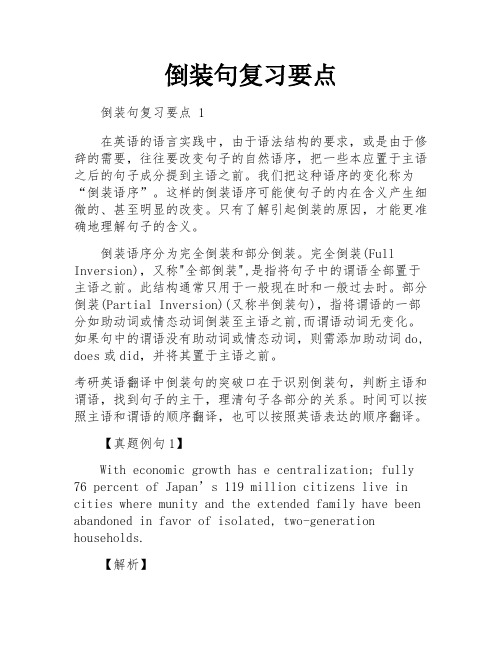
倒装句复习要点倒装句复习要点 1在英语的语言实践中,由于语法结构的要求,或是由于修辞的需要,往往要改变句子的自然语序,把一些本应置于主语之后的句子成分提到主语之前。
我们把这种语序的变化称为“倒装语序”。
这样的倒装语序可能使句子的内在含义产生细微的、甚至明显的改变。
只有了解引起倒装的原因,才能更准确地理解句子的含义。
倒装语序分为完全倒装和部分倒装。
完全倒装(Full Inversion),又称"全部倒装",是指将句子中的谓语全部置于主语之前。
此结构通常只用于一般现在时和一般过去时。
部分倒装(Partial Inversion)(又称半倒装句),指将谓语的一部分如助动词或情态动词倒装至主语之前,而谓语动词无变化。
如果句中的谓语没有助动词或情态动词,则需添加助动词do, does或did,并将其置于主语之前。
考研英语翻译中倒装句的突破口在于识别倒装句,判断主语和谓语,找到句子的主干,理清句子各部分的关系。
时间可以按照主语和谓语的顺序翻译,也可以按照英语表达的顺序翻译。
【真题例句1】With economic growth has e centralization; fully 76 percent of Japan’s 119 million citizens live in cities where munity and the extended family have been abandoned in favor of isolated, two-generation households.【解析】第一个句子主语centralization后面紧跟着第二个句子介绍centralization的内容,为使其保持紧凑,所以将介词短语With economic growth置于句首,第一个句子采用完全倒装结构。
正常语序应该是:Centralization has e with economic growth。
中考英语之重点语法复习——倒装句

考试要求倒装句因为与汉语语言习惯的不同,以及较多的句型结构而成为初中英语的难点,虽然初中英语涉及到的倒装句型不算太多,在中考试卷中也总有一定的比例,尤其在阅读理解和完形填空中对上下文的理解会有很大的影响,因此也是中考复习的重点。
倒装句的概念英语句子通常有两种语序:一种主语在前,谓语在后,称为陈述语序;另一种谓语的一部分或整个谓语在前,主语在后,称为倒装语序(如英语的疑问句形式)。
在初中阶段倒装句一般都作为特殊句型来处理。
初中常见倒装句型★1.So+b e/助动词/情态动词+主语.表示“……也是这样”,用于描述谓语所说情况也适用于另一个人或另一件事物,只能用于肯定情况,注意上、下句所使用的动词的时态要一致。
例如Y o u c a n r i de a bi k e.S o c a n I.你会骑自行车,我也会。
H e h a s b e en t o B e i j i n g.S o h a v e I.他去过北京,我也去过。
L i n P i n g w a s t h e r e l a st n i gh t.S o w a s e v er y o n ee l s e i n m y c l a s s.林平昨晚在那里,我们班其他人昨晚也都在那里。
H e s a w t h e s n a k e,a n d so di d I.他看见那条蛇了,我也看到了。
★注意:如果前一个句子有b e、助动词(如h a v e,w i l l等)和情态动词(如c a n,m u st等),就把这些词放在另一个句子主语前。
如果前一个句子谓语动词是行为动词,后句中要把助动词d o,d o e s或di d放在主语前,就像行为动词变疑问句一样。
★辨析:“S o+主语+b e/助动词/情态动词.”此句型不是倒装句,只是单纯地重复前面一句的意思,表示“的确如此;就是这样”。
例如—M y l i t t l e br o t h e r c a n sw i m i n t h e s e a.——我的小弟弟能在大海里游泳。
高中英语高三一轮复习:语法-倒装句的详细归纳总结
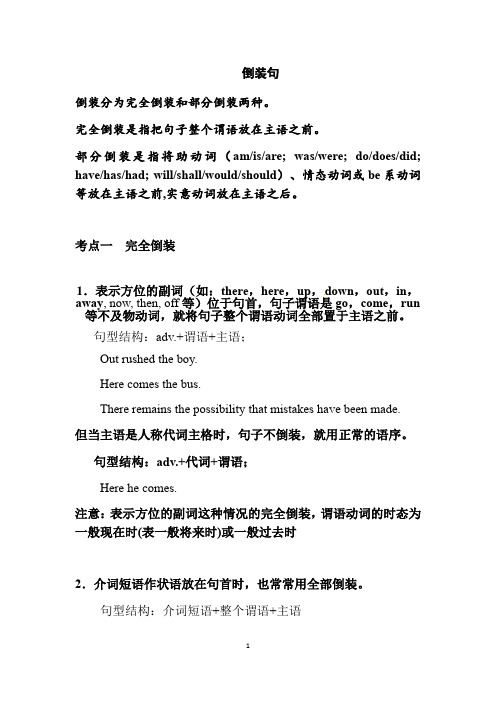
倒装句倒装分为完全倒装和部分倒装两种。
完全倒装是指把句子整个谓语放在主语之前。
部分倒装是指将助动词(am/is/are; was/were; do/does/did; have/has/had; will/shall/would/should)、情态动词或be系动词等放在主语之前,实意动词放在主语之后。
考点一完全倒装1.表示方位的副词(如:there,here,up,down,out,in,away, now, then, off等)位于句首,句子谓语是go,come,run 等不及物动词,就将句子整个谓语动词全部置于主语之前。
句型结构:adv.+谓语+主语;Out rushed the boy.Here comes the bus.There remains the possibility that mistakes have been made.但当主语是人称代词主格时,句子不倒装,就用正常的语序。
句型结构:adv.+代词+谓语;Here he comes.注意:表示方位的副词这种情况的完全倒装,谓语动词的时态为一般现在时(表一般将来时)或一般过去时2.介词短语作状语放在句首时,也常常用全部倒装。
句型结构:介词短语+整个谓语+主语With this new year come new challenges.South of the city lies a factory.Under the table sleeps a fat cat.In front of the house is standing a group of students.At the side of the hill stood an old house.注意:这种情况的完全倒装谓语动词的时态为一般现在时(表一般将来时)或一般过去时3.表语置于句首时,句子用完全倒装。
倒装结构为“表语+连系动词+主语”。
1)形容词+连系动词+主语Present at the meeting were some experts.2)过去分词/ 现在分词+连系动词+主语Gone are the days when they walked to work.3)介词短语+be+主语Among the goods are flowers,candles and toys.4.there be结构be动词可以换成exist;lie;stand;live; appear; seem; remain 等动词。
【中考英语复习之语法】课时07 特殊句(1倒装句 2祈使句 3感叹句 4附加疑问句)(学生版及答案)

第七课时.特殊句(1.倒装句 2.祈使句 3.感叹句 4.附加疑问句)一、完全倒装完全倒装是指将句子中的谓语动词全部置于主语之前。
此结构通常只用于一般现在时或一般过去时。
二、部分倒装部分倒装是指将谓语的一部分,如助动词或情态动词,置于主语之前。
如果句中的谓语部分不含有助动词或情态动词时,则需添加助动词do, does或did,并将其置于主语之前。
一、祈使句in as much effort as possible.A.puttingB.putC.to put2.—your hands before dinner, Tom.—Sure, Mom.A.WashB.To washC.Washing3.at people when you talk. This is a polite way of communication in China.A.LookB.LookingC.To look4.it over, and you will be able to work out the problem.A.ThinkingB.To thinkC.Think5.If you're interested in our business plan, this number and ask for Ms. Lee.A.callingB.callC.to call6.—How can I avoid the illness, Sir?— a mask when going out and wash hands with soap.A.WearsB.WearC.To wear7.—the dishes after dinner, Tony.—No problem, Mom.A.WashingB.WashC.To wash8.me a chance and I'll bring you a surprise.A.GiveB.GivingC.To give9.everyone with politeness even those who are very rude to you, not because they are nice, but because you are.A.TreatB.TreatingC.Treated10.for me at the bus station across from the post office. I can find you easily.A.WaitingB.To waitC.Wait二、附加疑问句附加疑问句由“陈述句+反意问句”构成,基本原则是“前否后肯,前肯后否”。
高中英语语法专题复习倒装句
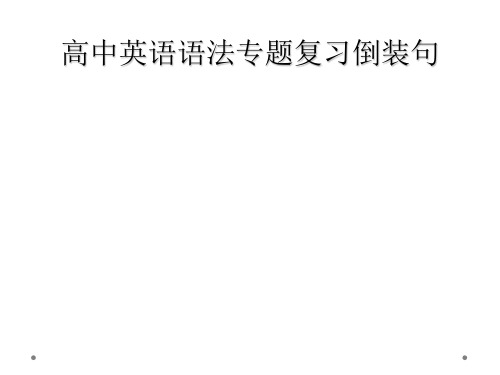
知识详解
部分倒装
9、用于某些表示祝愿的句子中。如: Long live the Chinese Communist Party.
跟踪练习
1.Scarcely _______ asleep _______ a knock at the door awakened him.
A. she had fallen; when B. she had fallen; than C. had she fallen; than D. had she fallen; when
Inside the pyramids are the burial rooms for the kings and queens and long passages to these rooms.
强调作用
They arrived at a farmhouse, in front which sat a small boy.
跟踪练习
9. ______ can you expect to get a rise. A. With hard work B. Although work hard C. Only with hard work D. Now that he works hard
10. _____ she wondered if she had made a mistake. A. Not until long afterwards that B. It was not until long afterwards that C. Not long until afterwards D. It was long afterwards until
知识详解
完全倒装
2、用于“here (there, now, then) + 不及物动词 +主语 (名词)”的句型中,或以out, in up down, away 等 副词开头的句子,以表示强调。如:
初三英语语法复习之法倒装句的使用

初三英语语法复习之法倒装句的使用初三英语学习主要是以深化基础知识为主。
初中阶段的语法在初一初二基本都学完了。
进入初三后,同学们的主要学习任务是辞汇量的大量扩充和综合复习运用全部初中的语法知识点。
下面是作者给大家带来的初三英语语法复习之法倒装句的使用,欢迎大家浏览参考,我们一起来看看吧!初中英语语法:倒装句全部倒装是只将句子中的谓语动词全部置于主语之前。
此结构通常只用与一样现在时和一样过去时。
常见的结构有:1) here, there, now, then, thus等副词置于句首, 谓语动词常用be, come, go, lie, run。
There goes the bell.Then came the chairman.Here is your letter.2) 表示运动方向的副词或地点状语置于句首,谓语表示运动的动词。
Out rushed a missile from under the bomber.Ahead sat an old woman.注意:上述全部倒装的句型结构的主语必须是名词,如果主语是人称代词则不能完全倒装。
Here he comes. Away they went.1、倒装句之部分倒装部分倒装是指将谓语的一部分如助动词或情态倒装至主语之前。
如果句中的谓语没有助动词或情态动词,则需添加助动词do, does或did,并将其置于主语之前。
1) 句首为否定或半否定的词语,如no, not, never, seldom, little, hardly, at no time, in no way, not until… 等。
Never have I seen such a performance.Nowhere will you find the answer to this question.Not until the child fell asleep did the mother leave the room.当Not until引出主从复合句,主句倒装,从句不倒装。
英语语法原则“倒装”考点透析
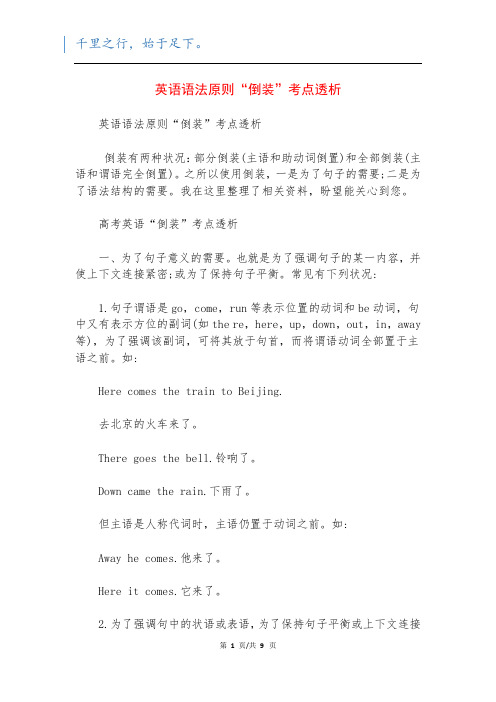
英语语法原则“倒装”考点透析英语语法原则“倒装”考点透析倒装有两种状况:部分倒装(主语和助动词倒置)和全部倒装(主语和谓语完全倒置)。
之所以使用倒装,一是为了句子的需要;二是为了语法结构的需要。
我在这里整理了相关资料,盼望能关心到您。
高考英语“倒装”考点透析一、为了句子意义的需要。
也就是为了强调句子的某一内容,并使上下文连接紧密;或为了保持句子平衡。
常见有下列状况:1.句子谓语是go,come,run等表示位置的动词和be动词,句中又有表示方位的副词(如the re,here,up,down,out,in,away 等),为了强调该副词,可将其放于句首,而将谓语动词全部置于主语之前。
如:Here comes the train to Beijing.去北京的火车来了。
There goes the bell.铃响了。
Down came the rain.下雨了。
但主语是人称代词时,主语仍置于动词之前。
如:Away he comes.他来了。
Here it comes.它来了。
2.为了强调句中的状语或表语,为了保持句子平衡或上下文连接紧密,可将状语或表语置于句首,句中主语和谓语完全倒装。
如:At the front of the hall sat the headmaster.校长坐在大厅的前部。
In this paragraph can be found an answer.在这段里能找到答案。
3.为了强调only及其所修饰的状语(通常是副词、介词短语或从句),则将它们移到句首,句中的主谓作部分倒装。
如:Only then did we realize that the man was blind.直到那时我们才发觉那个人是盲人。
Only when the war was over in 1918 was he able to get happily back to work.直到1918年战斗结束后,他才得以开心地重返工作岗位。
倒装句

倒装句(一)倒装句的意义1、适应一定的语法结构的需要,主要是指疑问句句型结构的需要。
e.g. May I come in?Was the People’s Liberation Army founded in 1927?2、为了强调某一部分,而把这部分放到句首,构成倒装。
e.g. Never have I been late for school this term.So early did he come to school that no other students came.(二)倒装的使用情况1、在“there be” 结构里,there是引导词,主语在be后。
e.g. There is a box on the table.2、在疑问句中。
e.g. Is she singing in the classroom?What does your mother do?3、在here, there等副词开头的某些句子里(要用一般现在时态),主语是名词时使用完全倒装。
如果主语是人称代词, 使用部分倒装。
e.g. There goes the bell.Here is an apple for you.There she comes.4、重复倒装句型,用在以so, nor, neither开头,表示谓语所述的情况也适用于另一个人或一事物的肯定或否定句中。
so用于肯定句,表示“也一样”、“也这样”;也可以使用as. nor, neither用于否定句,表示“同样也不,也不这样”。
e.g. I am watching TV. So is she.My parents didn’t watch TV last night. Neither (Nor) did I.5、直接引语的全部或一部分放在句首时,主句中的主谓也常直接倒装。
(完全倒装)e.g. “Very well,” said the French student.“Bring me two eggs and a cup of tea, please.” said he.6、在以never, not, not only, few, little, seldom ,hardly,等否定副词开头的句子中,采用部分倒装。
英语倒装句
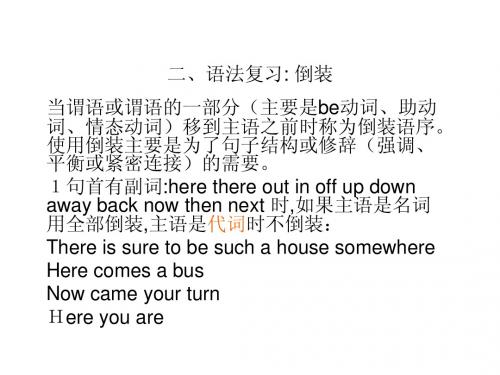
• In no case can we be careless while driving.
语法复习: 倒装
• ★B.典型句型: • hardly/scarcely ( had done)… when… • No sooner (had done) … than … • Hardly had he got to the station when the train pulled away. • =he had hardly got to the station when the the train pulled away . • no sooner had they reached home than it started pouring
语法复习: 倒装
• ★3.含否定意义的前置: • A.当no, not, never, hardly, seldom,scarcely, little by no means(决不) ,) , in no case ,neither , nor 等放在句首时,句子用部分倒装. • By no means shall we give up our belief • Never did I forget the days we spend together in this school. • Little does he care about what others think.(关心)
二、语法复习: 倒装
当谓语或谓语的一部分(主要是be动词、助动 词、情态动词)移到主语之前时称为倒装语序。 使用倒装主要是为了句子结构或修辞(强调、 平衡或紧密连接)的需要。 1句首有副词:here there out in off up down away back now then next 时,如果主语是名词 用全部倒装,主语是代词时不倒装: There is sure to be such a house somewhere Here comes a bus Now came your turn Here you are
高中语法复习-倒装

4、省略了if的虚拟条件句,把had/were/should 提到句首变为倒装句。 如果我是你的话,我就不会做这种事。 If I were you,I would not do such a thing. =Were I you, I would not do such a thing. Had we asked him a second time,we would Sure had have his advice. Were I to attend the meeting in shanghai, I would fly there tomorrow. Should I come late tomorrow, you could ask someone else to take my place.
二、部分倒装: 1、否定词或词组:如: never , not, seldom, hardly, little, nowhere, by no means, under no circumstances, by no means. Not until ,not a+名 词等,提到句首时,句子要用部分倒装。 1、Not a word did he say at the last meeting. 原句:He didn’t say a word at the last meeting.
She didn’t come back to school until 12 o’clock last night. Not until 12 o’clock did she come back last night . I have never been late for school this term. Never have I been late for school this term. She is not only intelligent but she also works very hard. Not only is she intelligent but she also works very hard.
- 1、下载文档前请自行甄别文档内容的完整性,平台不提供额外的编辑、内容补充、找答案等附加服务。
- 2、"仅部分预览"的文档,不可在线预览部分如存在完整性等问题,可反馈申请退款(可完整预览的文档不适用该条件!)。
- 3、如文档侵犯您的权益,请联系客服反馈,我们会尽快为您处理(人工客服工作时间:9:00-18:30)。
语法复习七:倒装句英语最基本的语序是主语在前,谓语动词在后。
但有时由于句子结构的需要或表示强调,就要采用倒装形式。
将谓语动词完全移到主语之前称为完全倒装,只将助动词或情态动词放到主语之前称为部分倒装。
强调性倒装和以so, neither, nor开头的句子是考题的热点。
(一)倒装句的意义1、适应一定的语法结构的需要,主要是指疑问句句型结构的需要。
e.g. May I come in?Was the People's Liberation Army founded in 1927?2、为了强调某一部分,而把这部分放到句首,构成倒装。
e.g. Never have I been late for school this term.So early did he come to school that no other students came.(二)倒装的使用情况1、在 "there be" 结构里,there是引导词,主语在be后。
e.g. There is a box on the table.2、在疑问句中。
e.g. Is she singing in the classroom?What does your mother do?3、在here, there等副词开头的某些句子里(要用一般现在时态)。
如果主语是人称代词,主语和主要动词的词序不变。
(完全倒装)e.g. There goes the bell.Here is an apple for you.There she comes.4、重复倒装句型,用在以so, nor, neither开头,表示谓语所述的情况也适用于另一个人或一事物的肯定或否定句中。
so用于肯定句,表示"也一样"、"也这样";nor, neither 用于否定句,表示"同样也不,也不这样"。
e.g. I am watching TV. So is she.My parents didn't watch TV last night. Neither (Nor) did I.5、直接引语的全部或一部分放在句首时,主句中的主谓也常直接倒装。
(完全倒装)e.g. "Very well," said the French student."Bring me two eggs and a cup of tea, please." said he.6、在以never, little, hardly, not only, few, not, seldom等否定副词开头的句子中,采用部分倒装。
如不放在句首就不要倒装。
e.g. Little did he say at the meeting.Never shall I forget the day when I joined the Army.比较:I shall never forget the day when I joined the Army.7、用于以only所修饰的副词、介词短语或状语从句的句子中。
e.g. Only when the war was over in 1918 was he able to get happily back to wrk.Only in this way can we learn English well.注意:如果only后的词组不是状语,不需倒装。
e.g. Only Wang Lili knows this.8、为了表达生动,有时把表地点、方位的副词,如 up, down, out, away, in等放在句首,同时把谓语动词放在主语之前。
若主语为人称代词,主语和谓语动词的位置不变,只将副词放在句首。
(完全倒装)e.g. Away hurried the boy.Out rushed the girl.9、在虚拟结构中,条件从句的谓语含有were, had 和should这三个词是,可省去if,将这些词移至主语之前。
e.g. Had I time (= If I had time), I would go and help you.Were I you (= If I were you), I would go abroad.Should he come (=If he should come), tell him to ring me up.10、as引导让步状语从句时要倒装(形容词/ 副词/ 名词/ 动词 + as + 主语 + 谓语)。
e.g. Proud as they are, they are afraid to see me.Child as he is, he seems to know everything.(child前不加冠词)Hard as he worded, he made little progress.11、用于某些表示祝愿的句子里。
e.g. May you succeed!Long live the People's Republic of China!12、So + 形容词、副词及such 置于句首时要倒装。
So happy did he feel. Such was me.练习:倒装句1. Not until I began to work ____ how much time I had wasted.A. didn't I realizeB. did I realizeC. I didn't realizeD. I realized2. Only by practising a few hours every day ____ be able to master the language.A. you canB. can youC. you willD. will you3. If you don't go, neither ____.A. shall IB. do IC. I doD. I shall4. No sooner ____ to the station ____ the train left.A. had I got, whenB. I had got, thanC. had I got, thanD. did I get, when5. ---- Your father is very strict with you. ---- ____. He never lets off a single mistake of oursA. So he isB. So is heC. He is soD. So does he6. ____ today, he would get there by Sunday.A. Would he leaveB. Was he leavingC. Were he to leaveD. If he leave7. Never in my life ____ such a thing. A. I have heard or have seenB. have I heard or seenC. I have heard or seenD. did I hear or see8. ---- Here ____! Where is Xiao Liu? ---- There ____.A. comes the bus, is heB. comes the bus, he isC. the bus comes, is heD. the bus comes, he is9. ____ , I will not buy it.A. Much as do I like itB. As much I like itC. Much as I like itD. As I like it much10. ---- I like football. I don't like volleyball. ---- ____.A. So do IB. Neither do IC. So it is with meD. So is it with me11._____ the expense, I _____ to Italy.A. If it were not, goB. Were it not for, would goC. Weren't it for, will goD. If it hadn t been, would have gone12. So _____ in the darkness that he didn' t dare to move an inch.A. he was frightenedB. was he frightenedC. frightened he wasD. frightened was he13.-In modem times, girls like beautiful clothes.-Yes, _____ and boys. After all, our life has greatly improved.A. so do they; so do youB. so they do; so you doC. so do they; so you doD. so they do; so do you14.-You have an English class every day except Sunday. --- _____.A. So we haveB. So we doC. So have weD. So do we15.1 wonder if your wife will go to the ball. If your wife _____, so _____ mine.A. does; willB.will; doesC.will; wouldD.does; do16. Only after I read the text over again _____ its main idea.A. that I knewB.did I knewC. 1 could knowD. I did know17.-You seem to have learned all the English words by heart.A.Sol doB.SodolC. So I haveD. So have 118. -I seldom watch TV, but listen to the radio a lot.A. So do IB. Neither do IC. I m the sameD. So it is with me19. So excited _____ that he couldn't say a word.A. he seemedB. did he seemC. was he seemingD. he did look20. Jimmy was so nervous not a single word _____ down in the dictation.A. he wroteB. he was writtenC. did he writeD. was he written21. Little ______ when 1 took the trip where it would lead me.A. have I knownB. had I knownC. do 1 knowD. did I know22. -Have you ever seen anything like that before? - ____.A. No, I never have seen anything like that beforeB. No, never I have seen anything like that beforeC. No, never have 1 seen anything like that beforeD. No, I have seen anything like that before never23. _____ , 1 would accept the invitation and go to the party.A. Were I youB. Was I youC. Had I been youD. Would 1 be you24. You should work less _____.A. and neither should IB. and so should IC. and nor should ID. and so I should25. _____ and caught the mouse.A. Up the cat jumpedB. The cat up jumpedC. Up jumped the catD. Jumped up the cat26. Not only _____ a promise, but also he kept it.A. did he makeB. he madeC. does he makeD. has he made27. His uncle is a worker and has been working in the factory for more than ten years. _____.A. So is his auntB. So has his auntC. So his aunt doesD. So it is with his aunt28. Not once _____ their plan.A. did they changeB. they changedC. changed theyD. they did change29.-Do you know Jim quarreled with his brother? -I don't know, and ______ .A. nor don't I careB. nor do I careC. I don't care neitherD. I don't care also30. Not until he arrived home _____ he find that this wallet had been stolen.A. didB. wouldC. whenD. that31. -This is one of the oldest trees in the world. - _____ such a big tree.A. Never I have seenB. I haven't never seenC. Never have I seenD. I have seen never32. Nowhere else in the world _____ cheaper tailoring(裁缝业, 成衣业)than in Hong Kong.A. a tourist can findB. can a tourist findC. a tourist will findD. a tourist has found33. _____ succeed in doing anything.A. Only by working hard we canB. By only working hard we canC. Only we can by working hardD. Only by working hard can we34. _____ that we all went out, lying in the sun.A. So fine was the weatherB. So was the fine weatherC. The weather was so fine wasD. So the weather was tine35. ____ a nice man ____ that we all believe him.A. So; did he seemB. So; he seemedC. Such; he seemedD. Such; did he seem36. -You seem to be an actor. -_____. I have played many parts in a lot of films.A. So do IB. So am IC. So I doD. So I am37. Not only ____ working hard, but also ____ very polite.A. the boy is; he isB. is the boy; he isC. the boy is; is heD. is the boy; is he38. _____ , he never seems able to do the work beautifully.A. Try as he doesB. As he triesC. Try as does heD. As try he does39.-I cannot see the picture well from here. - _____.A. Neither can t IB. Neither I canC. I can't neitherD. Neither can I40.- You ought to have given them some advice - _____, but who cared what I asked?A. So ought youB. So 1 oughtC. So it wasD. So I did41. So carelessly _____ that he almost killed himself.A. he drivesB. does he driveC. did he driveD. he drove42. Little _____ about his own health though he was very ill.A. he caredB. did he careC. he caresD. does he care43. Well ____ know him and well ____ know me.A. I did; he didB. did I; he didC. did I; did heD. I did; did he44. No sooner ____ they rushed out into the street.A. did they hear the news thanB. did they hear the news whenC. had they heard the news thanD. had they heard the news when45. Little wonder _____ up their hands in dismay.A. have some thrownB. some have thrownC. thrown some haveD. have thrown some46. _____ , he would have passed the exam.A. If he were to studyB. If he studied hardC. Had he studied hardD. Should he study hard47. We were lucky enough, for no sooner _____ home _____ it rained.A. we returned; andB. we had returned; whenC.did we return; whenD. had we returned; than48. So little _____ agree on the plan that they could not settle their difference.A. did theyB. do theyC. they didD. they did not49. _____ he realized it was too late to return home.A. No sooner it grew dark thanB. Hardly did it grow dark whenC. It was not until dark thatD. It was until dark that语法复习七:倒装句1~5 BDACA 6~10 CBBCC 11~15 BDDBA 16~20 BADBC 21~25 DCABC26~30 ADABA 31~35 CBDAD 36~40 DBADD 41~45 CBCCB 46~49 CDAC。
